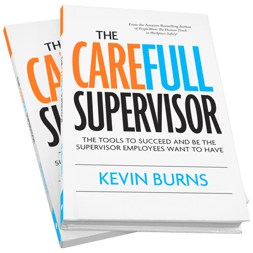The move toward personal leadership-focused safety culture requires that supervisors have management skills.
 Front-line supervisors are not only responsible for safety performance but almost all of the production activities. In addition, supervisors are responsible for assigning tasks, ensuring quality production and providing technical expertise. They have to do that while finding ways to help employees find their internal motivation and desire to do the job well. Employees also expect their supervisors to offer positive performance feedback. That's a key requirement to keeping employees engaged and motivated.
Front-line supervisors are not only responsible for safety performance but almost all of the production activities. In addition, supervisors are responsible for assigning tasks, ensuring quality production and providing technical expertise. They have to do that while finding ways to help employees find their internal motivation and desire to do the job well. Employees also expect their supervisors to offer positive performance feedback. That's a key requirement to keeping employees engaged and motivated.
Any shortfall in employee training falls onto the supervisor to fix. Poor employee skills training means the supervisor must fix that - on the fly. And the front-line supervisor is expected to fix safety procedure issues on the fly as well. Plus, the supervisor is expected to take employee concerns up to the appropriate middle manager.
The execution of training (or lack of it) falls upon the shoulders of the front-line supervisors. Most times, these folks are thrust into their jobs without any preparation. Most supervisors bring what they have learned on the job from the untrained supervisor that came before them. There is not much glory in being a front-line supervisor, but there’s a hell of a lot of responsibility to do it right. So why isn’t there more training and management skill development done with supervisors?
Here are three reasons why front-line and safety supervisors need solid management skills training:
1Most incidents happen at the front line. It’s a numbers game. There are simply more people working at the front-line than anywhere else in the company. And, there are more front-line supervisors than there are senior managers (well, you hope there are). That means more dangerous or physical work than anywhere else in the company. The highest number of people involved in production and operations are at the front-line. If something is going to happen from a safety perspective, the numbers say that it will happen at the front-line. The front-line supervisor must maintain safe production and the safety of the front-line employee. To make that happen requires communication and feedback skills. A supervisor reluctant to engage in feedback because they lack skills would surely increase the odds of an incident.
2The highest percentage of staff turnover happens at the front-line. People don’t leave a company, they leave their immediate supervisor. The relationship between supervisor and the front-line employee will determine either teamwork or a lack of mutual respect. When employees have had enough of the job, it usually means they’ve either had enough of their boss. Or, it might be the poor working conditions that their immediate supervisor has created. Either way, employees will leave a supervisor without rudimentary management skills or ability. That's turnover. The longer a crew stays together, the tighter they become as a unit and the better the safe production. But turn over staff and there are always new people in the mix. That creates a high-probability for an incident.
3Safety culture is created and reinforced at the front-line. The how-we-do-things-’round-here philosophy is not created at the top. Senior managers may push new safety initiatives, but the front-line culture can eat it for lunch. Untrained supervisors may resist rolling out a new safety initiative. A lack of confidence to push something new onto their crew will stop the new idea. So, they will find a reason why “it won’t work here.” Safety culture and how-we-do-things-’round-here are centered in the relationship between employee and immediate supervisor. To improve the safety culture, you must improve the relationships supervisors have with employees. That takes management skills.
Employee safety training is important. But even more important are the skills required by supervisors to support and reinforce that training.
The move toward personal leadership-focused safety culture requires that supervisors have management skills. Coaching and inspiring better performance from front-line employees means supervisors need better skills. Since the biggest part of safety performance depends on clear communication and solid feedback, let’s make sure the supervisors have these tools. It’s not enough to know the safety rules. Supervisors need skills to be able to communicate in an effective way.
 Let's make sure the front-line supervisors get the tools to improve communications and effectiveness. Safety performance depends on it. Of course, if you are a supervisor, don't sit around and just wait for someone to hand you your training. Go out and get started yourself. Read a book on management skills (something you bought for yourself). Invest in your own effectiveness while your employer figures out what they're going to do.
Let's make sure the front-line supervisors get the tools to improve communications and effectiveness. Safety performance depends on it. Of course, if you are a supervisor, don't sit around and just wait for someone to hand you your training. Go out and get started yourself. Read a book on management skills (something you bought for yourself). Invest in your own effectiveness while your employer figures out what they're going to do.
Kevin Burns is a management consultant, safety speaker and author of "The Perfect Safety Meeting" and his newest #1 Amazon Health & Safety Bestseller, "Running With Scissors - 10 Reasons To Invest in Safety In Slow Times." He is an expert in how to get through to people - how to talk with them so they hear and understand. Kevin's presentation "Trust The Process - Instill A Safety Attitude To Build An Engaged Culture Of Safety" will help your organization reach the following goals: better engagement and buy-in to safety, increased teamwork, better communication, lower turnover resulting in increased profits from production. Click here for more information and to discuss your needs with Kevin.
(c) Can Stock Photo


